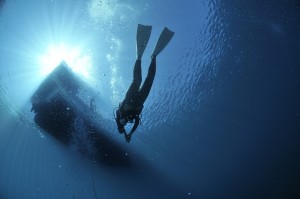As you know if you’re a regular reader of this blog, we like to encourage people to enjoy a wide variety of sporting and leisure activities and to emphasise that coming to Aberdeen to work with RGU does not mean giving up your interest in karate, riding, croquet or cricket. Even if you’re already living here, it’s always interesting to find out what other activities you can do beyond football (and yes, we do like supporting the Dons too!).
Assuming you can swim, there is a reasonable chance that you’ve used a snorkel at some time. Mucking about in the Mediterranean on holiday and watching the fish is a very enjoyable way to spend half an hour, but it’s only (literally) brushing the surface of what is a popular pastime. Diving, specifically sub-aqua diving, is the real way to get below the waves and reveals far more of what happens under the sea than a quick plunge with a snorkel. Moreover, it’s a sport that has a lot of participants in the NE of Scotland (including one in the recruitment team at RGU!).
Diving, from my perspective as a non-diver, seems to be a bit like mountaineering – you do it, I presume, because, like mountains, the sea “is there”. Also, there is a lot more sea than land! Upon further investigation I discovered that, for whatever reasons, this is clearly a popular sport in the NE because there are a lot of clubs and associations in our area. Not only that, but they don’t just dive off the east coast. Many travel to the Moray Firth and to the west coast and even dive off St Kilda.
As you’d expect, it’s a sport that takes safety very seriously indeed.
It seems that the best place to start is the British Sub-Aqua Club (BSAC) as it’s the national governing body for the sport. They organise training courses and award qualifications that are necessary for more serious diving. Their Aberdeen branch meets in the Cocket Hat on North Anderson Drive.
There is also a Scottish Sub-Aqua Club (SSAC) and there are other organisations which offer qualifications. One of the best known is the Professional Association of Diving Instructors (PADI), but there are also many others, including the World Underwater Federation CMAS, Scuba Schools International (SSI), the National Association of Underwater Instructors (NAUI), the Health and Safety Executive (HSE), which lists all the different forms of diving, from police and military to commercial and even media diving (which is the sort of stuff they do for James Bond films). As you can see, divers like their acronyms!
If you’d like to find out more about diving in the North East, here are some links*
http://www.aberdeenbsac.org.uk
http://www.bsac.com/PopupClubDetails.asp?id=B0067&popout=true
http://www.aberdeensportsvillage.com/aquatics/diving
http://www.northeastdive.co.uk
Most of the local organisations also have Facebook pages which are worth a look too.
Next time, we’ll explain (courtesy of the person in the recruitment team – thanks Julie!) – a bit more about just what makes this such as fascinating sport, and why the NE is a great place to dive.
Lynsey Duncan, Resourcing Co-ordinator
* usual warning applies – we are not responsible for the content of other websites.

